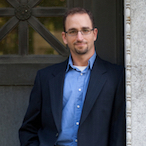
"This is the perfect time to reinvent ourselves"
Socially Responsible Investing has enjoyed a period of growth spanning back several decades that could be the envy of many other sustainable industries. Even during the economic downturn following the housing crisis of 2008, SRI kept climbing its ladder. Financial assets under SRI management now exceed $33.3 Trillion (or one in every six dollars in professional investment management), and they're being used to influence corporate governance in ways that have lasting and measurable impacts.
And yet, there's a sense that we're not moving the needle fast enough. As SRI manager Michael Kramer explains in a recent op-ed on GreenBiz.com,
"Corporate disclosure of social and environmental performance remains voluntary, and commitments to significantly reduce carbon emissions remain few and far between, even as we continue to develop new fossil fuel resources. Meanwhile, in marketing and facile public discourse, sustainability has been significantly watered down, too often simply serving as a green patina atop business as usual. It’s time that we dig deeper."
That watering down has led some to consider shifting the conversation toward "resilience" as opposed to sustainability. Kramer is among them. Kramer and his colleagues recently released a new book called The Resilient Investor. The book includes a chapter called "Weaning off Wall Street", which is a particularly refreshing strategy I'd not usually expect from an investment advisor.
The argument for the shift in mindset, they say, is that resilience is proving effective in many industries, from urban planning to clean technologies to agriculture, but so far has not been used as a framework for investing. But it's not just money they're talking about. It's life.
Kramer explained that everyone, no matter how financially impoverished, has assets. People who have more money may have a lot less time, for instance. When it boils down to it, is the concept of planning one's assets for future growth that much different if it's money or something less tangible? The book lays out a plan for investing one's life assets in a 3x3 matrix. The Resilient Investing Map, as they call it, has 3 types of assets on one axis: personal, financial, and tangible. On the other axis, it has 3 types of impact areas: close to home, global economy, and evolutionary.
This framework allows me, for instance, to think about how I want to spend my free time on a Tuesday night. Do I want to put some of my time (personal asset) into a local (close to home) project? If so, I might think about volunteering with a local bike advocacy group on a community service project to fix a pothole in a bike lane. Or, I might think about writing a blog post for TriplePundit. In doing so, I invest my personal asset of time into an evolutionary outlet (teaching the people about living sustainably). In either case, I've now invested an asset of mine in a way that may well pay dividends down the road for me personally, but definitively has a positive impact on the world. Perhaps that bike advocacy group does a bike valet for my next event. Perhaps someone who reads my column makes a change in their life that ends up feeding the global sustainable economy in a way that comes back around to me (even if that's just a sense that the world is getting better).
In other words, it's diversification, that time-honored tradition of investing, broadened out (diversified, if you will) to include other assets I have. I'm investing in my life and my future, but without putting a dollar down for it. Because when it comes down to it, if all of your assets are locked up in a diversified portfolio in the stock market and the entire stock market crashes...you're not diversified enough!
During a recent Sustainability Unconference, I sat down with Kramer to discuss the finer details of how the field is changing, (and also one very cool new Sesame Street character).

Scott Cooney, Principal of GreenBusinessOwner.com and author of Build a Green Small Business: Profitable Ways to Become an Ecopreneur (McGraw-Hill, November 2008), is also a serial ecopreneur who has started and grown several green businesses and consulted several other green startups. He co-founded the ReDirect Guide, a green business directory, in Salt Lake City, UT. He greened his home in Salt Lake City, including xeriscaping, an organic orchard, extra natural fiber insulation, a 1.8kW solar PV array, on-demand hot water, energy star appliances, and natural paints. He is a vegetarian, an avid cyclist, ultimate frisbee player, and surfer, and currently lives in the sunny Mission district of San Francisco. Scott is working on his second book, a look at microeconomics in the green sector. In June 2010, Scott launched GreenBusinessOwner.com, a sustainability consulting firm dedicated to providing solutions to common business problems by leveraging the power of the triple bottom line. Focused exclusively on small business, GBO's mission is to facilitate the creation and success of small, green businesses.














